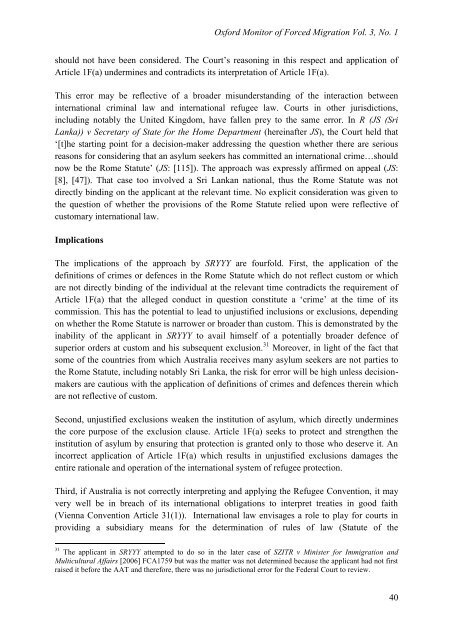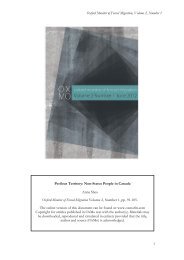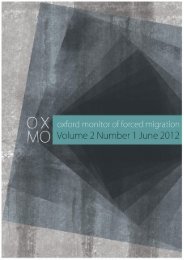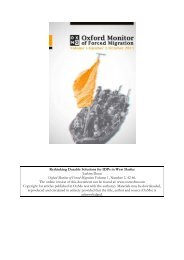Oxford Monitor of Forced Migration, Volume 3, Number 1
Oxford Monitor of Forced Migration, Volume 3, Number 1
Oxford Monitor of Forced Migration, Volume 3, Number 1
You also want an ePaper? Increase the reach of your titles
YUMPU automatically turns print PDFs into web optimized ePapers that Google loves.
<strong>Oxford</strong> <strong>Monitor</strong> <strong>of</strong> <strong>Forced</strong> <strong>Migration</strong> Vol. 3, No. 1should not have been considered. The Court’s reasoning in this respect and application <strong>of</strong>Article 1F(a) undermines and contradicts its interpretation <strong>of</strong> Article 1F(a).This error may be reflective <strong>of</strong> a broader misunderstanding <strong>of</strong> the interaction betweeninternational criminal law and international refugee law. Courts in other jurisdictions,including notably the United Kingdom, have fallen prey to the same error. In R (JS (SriLanka)) v Secretary <strong>of</strong> State for the Home Department (hereinafter JS), the Court held that‘[t]he starting point for a decision-maker addressing the question whether there are seriousreasons for considering that an asylum seekers has committed an international crime…shouldnow be the Rome Statute’ (JS: [115]). The approach was expressly affirmed on appeal (JS:[8], [47]). That case too involved a Sri Lankan national, thus the Rome Statute was notdirectly binding on the applicant at the relevant time. No explicit consideration was given tothe question <strong>of</strong> whether the provisions <strong>of</strong> the Rome Statute relied upon were reflective <strong>of</strong>customary international law.ImplicationsThe implications <strong>of</strong> the approach by SRYYY are fourfold. First, the application <strong>of</strong> thedefinitions <strong>of</strong> crimes or defences in the Rome Statute which do not reflect custom or whichare not directly binding <strong>of</strong> the individual at the relevant time contradicts the requirement <strong>of</strong>Article 1F(a) that the alleged conduct in question constitute a ‘crime’ at the time <strong>of</strong> itscommission. This has the potential to lead to unjustified inclusions or exclusions, dependingon whether the Rome Statute is narrower or broader than custom. This is demonstrated by theinability <strong>of</strong> the applicant in SRYYY to avail himself <strong>of</strong> a potentially broader defence <strong>of</strong>superior orders at custom and his subsequent exclusion. 31 Moreover, in light <strong>of</strong> the fact thatsome <strong>of</strong> the countries from which Australia receives many asylum seekers are not parties tothe Rome Statute, including notably Sri Lanka, the risk for error will be high unless decisionmakersare cautious with the application <strong>of</strong> definitions <strong>of</strong> crimes and defences therein whichare not reflective <strong>of</strong> custom.Second, unjustified exclusions weaken the institution <strong>of</strong> asylum, which directly underminesthe core purpose <strong>of</strong> the exclusion clause. Article 1F(a) seeks to protect and strengthen theinstitution <strong>of</strong> asylum by ensuring that protection is granted only to those who deserve it. Anincorrect application <strong>of</strong> Article 1F(a) which results in unjustified exclusions damages theentire rationale and operation <strong>of</strong> the international system <strong>of</strong> refugee protection.Third, if Australia is not correctly interpreting and applying the Refugee Convention, it mayvery well be in breach <strong>of</strong> its international obligations to interpret treaties in good faith(Vienna Convention Article 31(1)). International law envisages a role to play for courts inproviding a subsidiary means for the determination <strong>of</strong> rules <strong>of</strong> law (Statute <strong>of</strong> the31 The applicant in SRYYY attempted to do so in the later case <strong>of</strong> SZITR v Minister for Immigration andMulticultural Affairs [2006] FCA1759 but was the matter was not determined because the applicant had not firstraised it before the AAT and therefore, there was no jurisdictional error for the Federal Court to review.40








